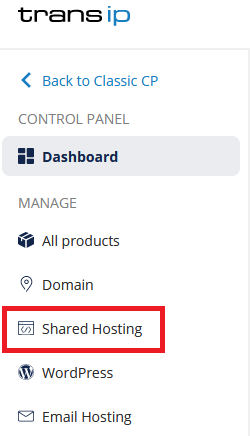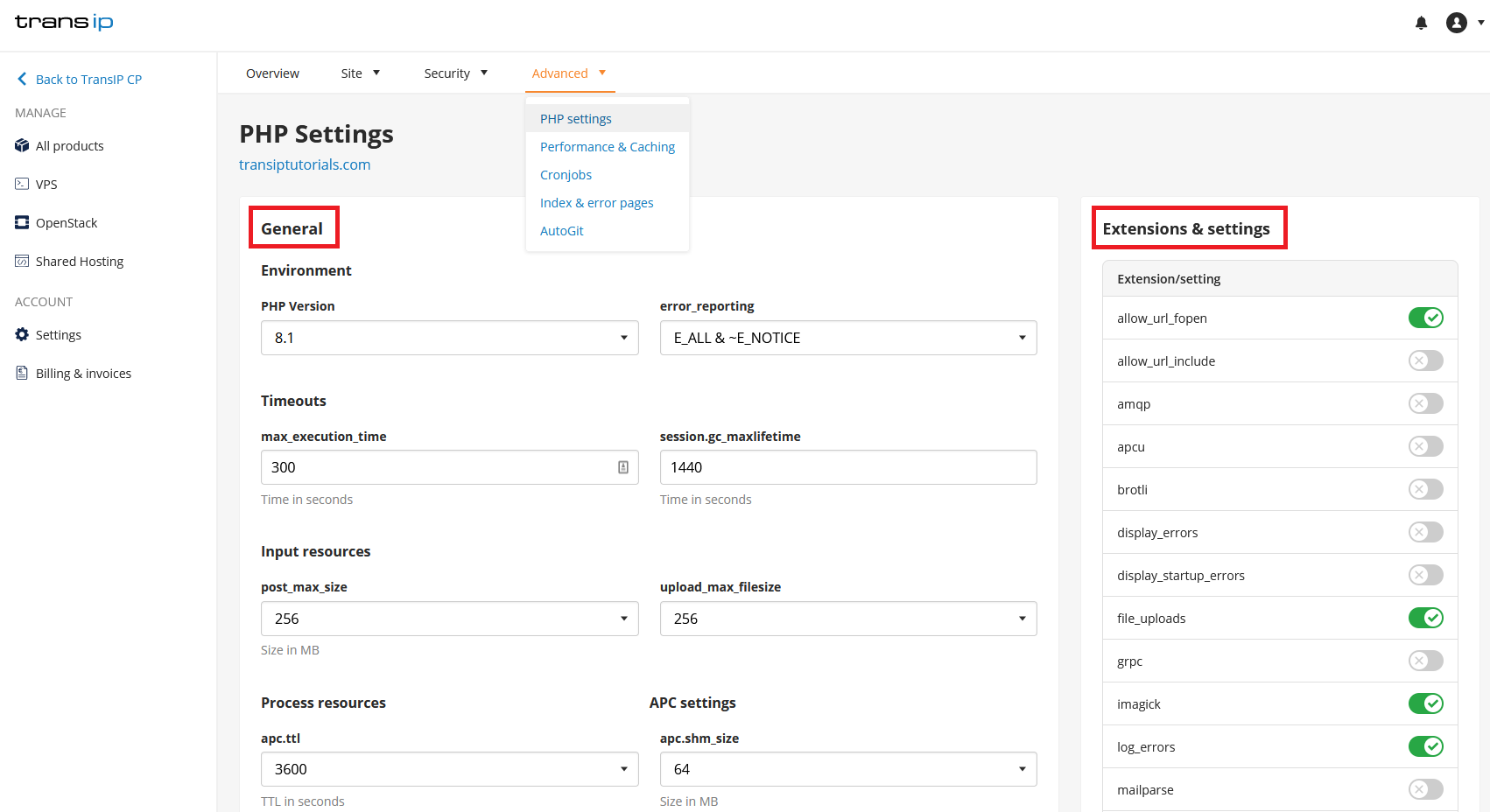To change the PHP extensions of your webhosting package, log in to the control panel and click 'Shared Hosting' in the menu. Next, select your domain below 'Products'.

Click 'Advanced' in the top bar and click 'PHP settings'.

The PHP settings page in your control panel is divided into two sections: 'General' settings on the left side and 'Extensions & settings' on the right side.
In this article we will focus on the settings below 'Extensions & settings'. The general settings can be found the the article 'The PHP-settings of my webhosting package'.
Attention: We recommend to only change the PHP settings when there is a need to do so. Incorrect settings may cause your website to not function properly, or not at all.
Below we will give a short desciption of each option, mostly originating from PHP.net. For more information it is best to read the documentation on PHP.net.
allow_url_fopen
This option enables the URL-aware fopen wrappers. They allow URLs to be accesed like files.
allow_url_include
This option allows the following functions to be used with URL-aware fopen wrappers: include, include_once, require, require_once. To be able to use this option, allow_url_fopen needs to be enabled.
amqp
AMQP means Advanced Message Queuing Protocol. The AMQP extension for PHP allows for cummunication with servers compatible with AMQP.
apcu
APCU is a form of PHP caching.
brotli
Brotli compesses HTTP content. Brotli is often compared to Gzip.
display_errors
Enabling display_errors causes error messages from your website to be shown in the browser, which can be useful for troubleshooting. Because showing your errors publicly is not always wanted, you can always find your errors in your Error Log.
display_startup_errors
Shows error messages during the startup sequence of PHP. Unless you are debugging, it is best to leave this set to 'off'.
file_uploads
This allows or disables HTTP file uploads.
grpc
Remote Procedure Call framework. Contains libraries that allow communication of clients and servers that support grpc.
imagick
ImageMagick. Can be used to edit and convert images and works with almost all image types.
ioncube
Encryption and optimalisation for PHP code. ionCube can improve both your website's security and performance.
log_errors
This settings enables or disables logging errors to your Error Log.
Attention: We strongly recommend to leave log_errors enabled. When disables, you are no longer able to troubleshoot errors. In that case your only option is restoring a backup.
mailparse
An extension with which you can extract data from emails. For instance to process orders or forms.
mongodb
Enables support for mongodb, a NoSQL database management system.
newrelic
Monitoring software for appliocations and infrastructure. A newrelic licence key can be entered below newrelic.license, in the 'General' options on the PHP settings page.
oauth
Authorisation protocol which uses tokens. This allows an application access for a set time without using login credentials.
opcache
Caching for PHP scripts. Prevents PHP scripts from having to load on every request.
opcache.validate_timestamps
When enabled, will check PHP scripts for changes. The frequency can be set in the left column below opcache.revalidate_freq.
output_buffering
When enabled, HTML will be sent to the browser all at once after your PHP script is done.
When disabled, HTML will be sent simultaneously but in pieces.
phalcon
Phalcon is an open source full stack PHP framework, optimised for high performance. Phalcon is currently only supported with PHP version 7.4.
psr
PSR stands for PHP Standard Recommendation. This PHP extension offers the interfaces of the PSR standard which are determined by the PHP-FIG group.
rdkafka
Kafka client for PHP, based on librdkafka.
session.use_cookies
This option determines whether session ID's are stored in cookies.
ssh2
Secure Shell 2. Allows access to resources (shell, remote exec, tunneling, file transfer) on an external computer or server by using secure cryptographic transport.
yaml
YAML (YAML Ain't Markup Language) is a data serialisation language for programming languages.
zmq
ZeroMQ is a software library which is used to design and implement a message-based application.




